|
On January 8, 2020, the U.S. Court of Appeals for the Second Circuit decided to keep blocking the implementation of the Department of Homeland Security (DHS) changes to the “public charge” test. The test is used to deny admission to the United States or refuse an application for lawful permanent resident status (a “green card”). The court rulings mean that for immigrants seeking green cards in the U.S., the old rules apply-- they can keep using Medi-Cal/Medicaid, CalFresh/food stamps, and federal housing programs that help their families stay healthy. And family members can continue to receive cash benefits without affecting a relative’s green card application unless the benefits are the family’s only income.
The court ruling does not affect the public charge decisions made by the Department of State (DOS). People applying for a green card through a U.S. consulate face a different rule, which is in the process of changing. Those who expect to apply for a visa or have their green card interviews outside the U.S. should consult an immigration lawyer. This morning, the National Immigration Law Center, National Health Law Program, Western Center on Law & Poverty, and Asian Americans Advancing Justice-Los Angeles filed a lawsuit against the Trump Administration to block the implementation of the DHS final rule, which threatens millions of immigrant families —disproportionately families of color. . The suit, filed in the Northern District of California, was filed on behalf of nonprofits serving immigrant communities and advocates for racial equity, health, children, farm workers, and working families today. La Clínica de la Raza et al. v. Trump et al. filed in the U.S. District Court for the Northern District of California, asks the court to declare the regulation issued by DHS unlawful and unconstitutional.
In addition to La Clínica de la Raza, the suit was brought by African Communities Together, the California Primary Care Association, the Central American Resource Center, the Council on American Islamic Relations -California, Farmworker Justice, the Korean Resource Center, the Legal Aid Society of San Mateo County, and Maternal and Child Health Access. As you may already know, thirteen states led by Washington Attorney General Robert Ferguson filed a lawsuit Wednesday, as well as the Counties of San Francisco and Santa Clara, to challenge the rule as well. The rules proposed in OCTOBER 2018 ARE NOT YET IN EFFECT and are not final until they are officially adopted; not every immigrant is affected by the changes so they should consult LIBRE or other knowledgeable immigration groups; affected individuals and communities/agencies are opposing these changes and they can participate in trying to stop the regulation changes; AND there will be time to make adjustments to benefits if these proposals become finalized. Like our Facebook page to get notices of any updates on Puublic Charge issues.
AILA members have reported that ICE ERO and its contractors are conducting a new "voluntary" survey that affects Central American clients. The sign below reveals that "starting in January 2019 representatives from ICE may call you on the phone number provided to ICE" to conduct a 30 minute survey. While the sign states that "your answers to the survey will not be used for any enforcement purposes," AILA National's ICE Liaison Committee recommends that each attorney discuss with their clients the potential risks of participation/non-participation in this voluntary survey, and that all parties make an individual determination depending on each client's specific facts and history. AILA is seeking more information from ICE on this development and will post updates if they become available.
One of the Trump administration’s most insidious attacks on immigrants is at risk of flying under the radar - but you can help expose the truth.
The administration is trying to expand a rule with racist roots called “public charge” to punish immigrants for taking care of their families.
We only have until December 10th to submit public comments to oppose Trump's cruel proposal. That’s why we're so excited to reshare this NEW VIDEO, created by CIPC’s Impact Video Producer, Set Hernandez Rongkilyo, which breaks down this critical issue in everyday language and lets people know how they can fight back. Please share this video to encourage every Californian to #ProtectFamilies and help stop Trump’s cruel attack.
Our friends at ILRC have created a Guide for those with no Immigrantion Status
Young boy, taken from mother, on solo trip through 4 states in 6 months
Has someone told you that you can “get papers” or residency because your child has a disability? If so, READ THIS FIRST. People CAN'T get a green card or other immigration relief just because their child has a disability, even a very serious one. Immigration law has a list of ways to qualify for a green card or other immigration relief: family Immigration, U VISA, Employment Immigration, T-VISA, Asylum, SIJS, etc. Being the parent of a disabled child is NOT on this list. Immigration does not have an “application for papers based on having a disabled child.”
Immigration judges can approve papers to some people who are in deportation proceedings, if the person meets specific requirements and if the judge finds that their situation deserves special treatment. Having a disabled child is one reason that an immigration judge might find that someone who is in deportation proceedings deserves special treatment. However, to “get papers” in this way you must be in deportation proceedings. Some lawyers, notarios, and others put people in deportation proceedings with the plan of asking the judge to give them papers because of their disabled children. However, this is risky! Nothing requires the immigration judge to decide to give the parent papers. The immigration judge could – and immigration judges do – instead order parents to leave the US (i.e. deport them). If you are not in deportation proceedings, “applying for papers because you have a disabled child” means putting yourself in deportation proceedings and asking the judge to give you special treatment. If the judge does not think that you deserve special treatment in light of your particular situation, you will be deported. Don’t trust someone you barely know with your life without finding out more. Before you pay someone to help you with an immigration case:
WARNING: In the United States, a “NOTARY” is not a “NOTARIO PUBLICO.” In the US, only a lawyer or BIA accredited representative can give legal advice. In many Latin American countries, a “Notario” is a person who went to college and obtained a degree in law. “Notarios” are authorized to give advice and legal help in these countries. In the United States, a “Notary” does not have go to law school or college; a notary is NOT trained to help people with immigration. Notaries are only allowed to verify the identity of the person signing a document. If you need immigration help, go to a lawyer or BIA representative. A California Notary cannot legally write a legal document or file immigration forms for you. Do not be fooled. If you need help, find a qualified and authorized person to do it. Do your homework and investigate the credentials of the person you ask for help. You can check if someone is a California licensed lawyer & whether they have a record of discipline at the California Bar Website: http://members.calbar.ca.gov/fal/membersearch/quicksearch You can check if someone is a BIA accredited representative at https://www.justice.gov/eoir/recognized-organizations-and-accredited-representatives-roster-state-and-city . For more information, see https://www.uscis.gov/avoid-scams AuthorJenny Horne works on the Teen Parent Project and Protecting Victims of Domestic Violence Project. She is a graduate of Stanford Law School and founded the Teen Parents Project as a Skadden fellow at Legal Aid in 1994. Prior to her fellowship, Jenny clerked for Judge Alfred Goodwin in the Ninth Circuit Court of Appeals. In recognition of her excellent work, she was inducted into the San Mateo County Women’s Hall of Fame; received the Silver Award from the Peninsula Partnership Council’s first biannual Children’s Report Initiative in 2002; and in 1999, received a Commendation from the San Mateo County Board of Supervisors and the San Mateo County Perinatal Council for services provided to San Mateo County school-age parents. The San Mateo Rapid Response Network is a collaboration between Faith in Action Bay Area and Pangea Legal Services. This is a 24 hour number system which has been created to expand the community’s capacity to monitor and document ICE operations in real time and to support the process of gathering evidence used to free someone from ICE custody.
This number is only for San Mateo County. Other counties have their own systems with differnet numbers. |



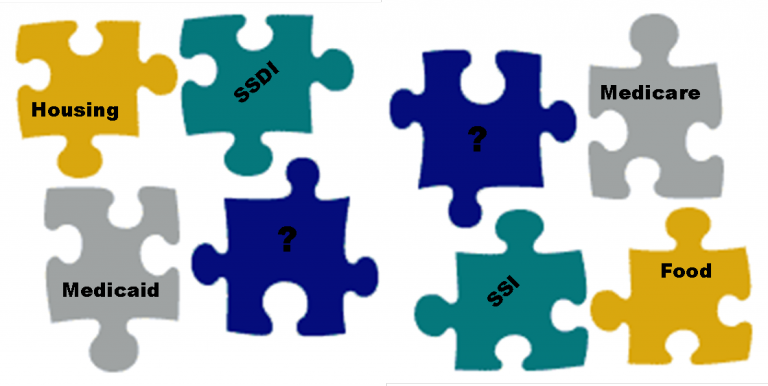
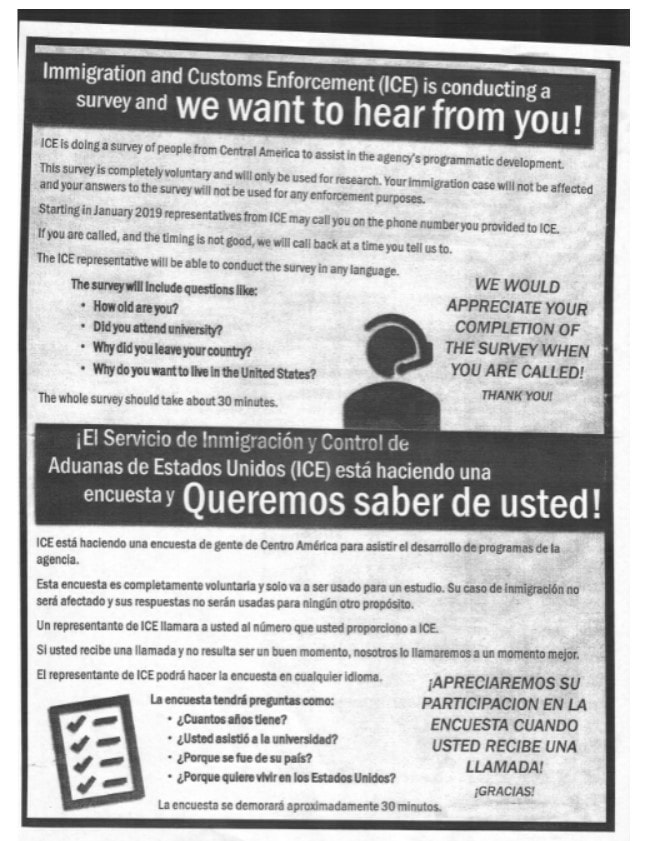
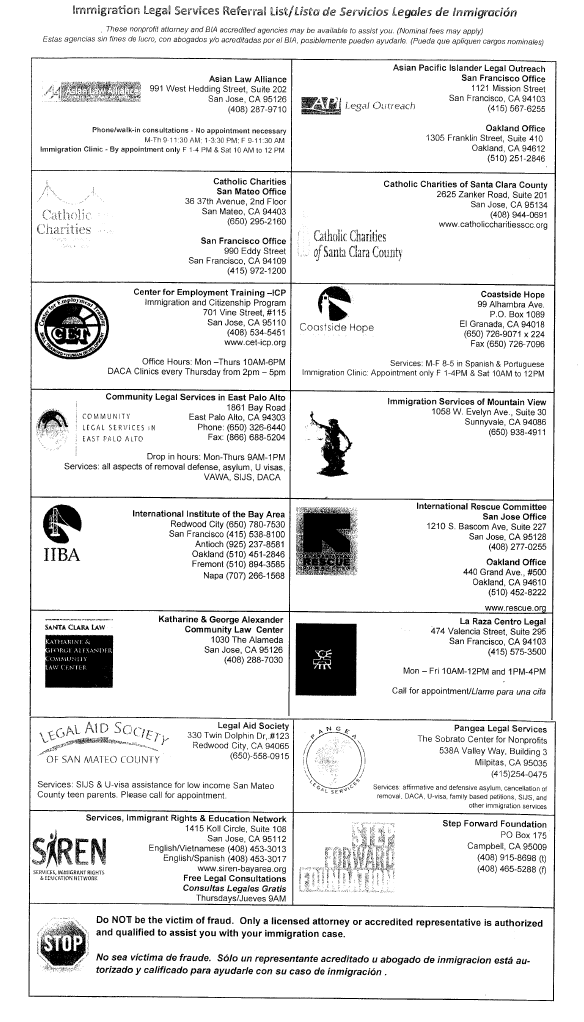
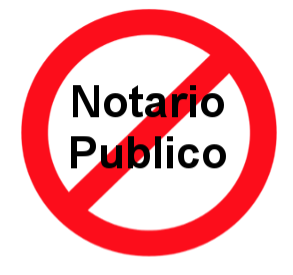
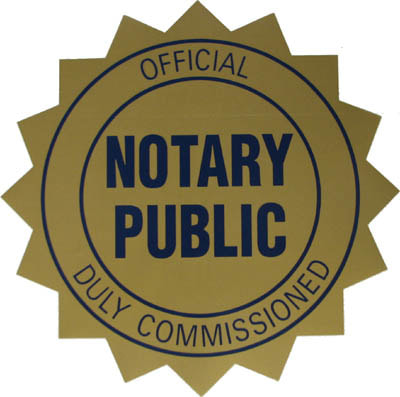
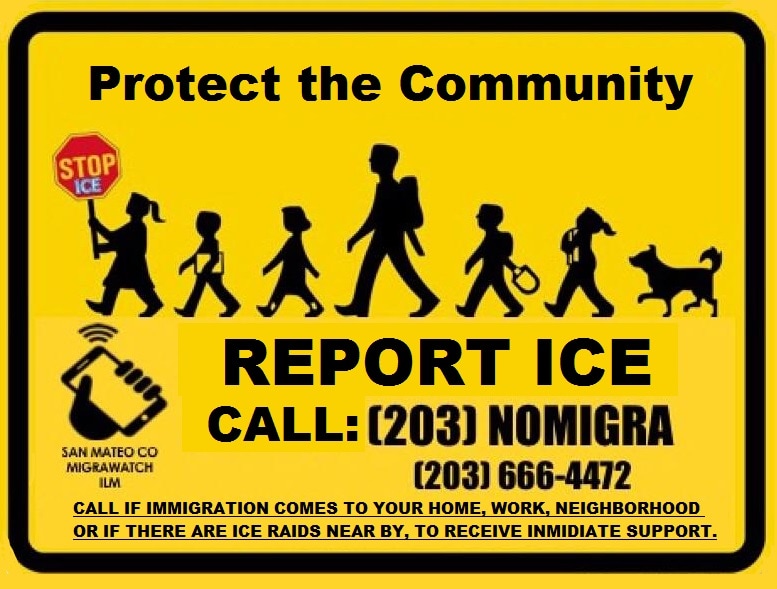
 RSS Feed
RSS Feed
